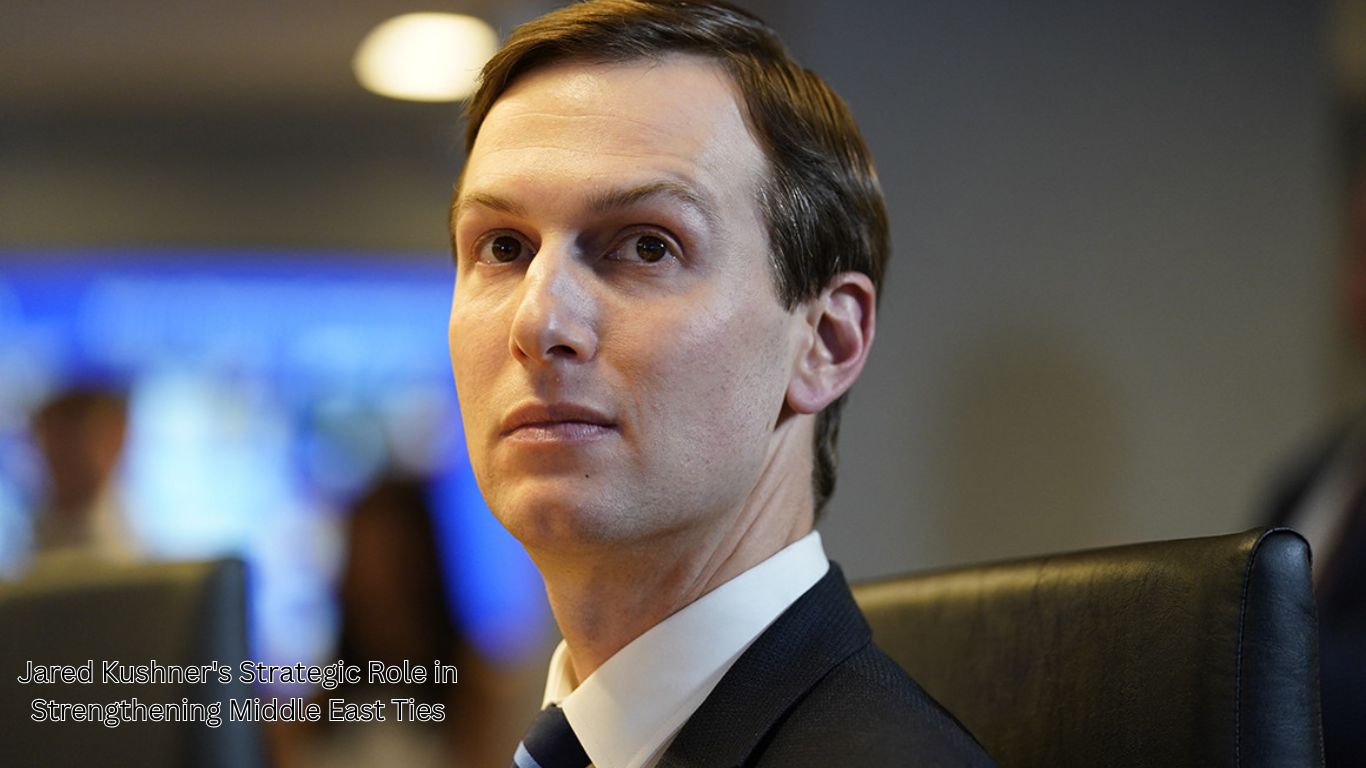Introduction
Jared Kushner, former U.S. President Donald Trump’s son-in-law, has become an influential figure in shaping the Middle East’s diplomatic landscape. Over recent years, his business ventures and political connections have allowed him to broker agreements that have profoundly impacted the region. The ongoing geopolitical shifts in the Middle East make Kushner’s involvement in these affairs timely and significant.
This article takes a closer look at his role in fostering strategic partnerships in the Middle East and what these developments could mean for regional stability and global diplomacy.
Kushner’s Role in Middle Eastern Diplomacy
Kushner’s engagement with the Middle East began during his tenure as a senior adviser to President Trump. A defining moment in his diplomatic career was his involvement in the Abraham Accords, an initiative that aimed to normalize relationships between Israel and several Arab nations. His efforts not only secured political breakthroughs but also helped usher in a new era of cooperation in the region.
Through his direct relationships with leaders like Saudi Arabia’s Crown Prince Mohammed bin Salman and the UAE’s Mohammed bin Zayed, Kushner has become a key mediator between the U.S. and various Middle Eastern states. His ability to combine diplomacy with business insights has been central to his success in the region.
The Abraham Accords: A Historic Milestone
One of Kushner’s most significant achievements is the Abraham Accords, which resulted in peace agreements between Israel and the United Arab Emirates (UAE), Bahrain, and later, Sudan and Morocco. These groundbreaking agreements have rewritten long-standing diplomatic norms in the region by breaking the historical trend of Arab nations avoiding official ties with Israel.
Beyond just political symbolism, the Abraham Accords have opened the door for new opportunities in sectors like trade, defense, and technology, creating a new framework for cooperation. Kushner’s role in brokering these deals has solidified his reputation as a powerful force in Middle Eastern diplomacy.
The Strategic Blend of Politics and Business
Kushner’s strategy in the Middle East goes beyond political discussions; it includes a strong focus on economic collaboration and security partnerships. Many nations in the region, particularly those in the Gulf, are eager to diversify their economies beyond oil. Kushner’s approach has aligned with these ambitions by promoting joint ventures in infrastructure, technology, and renewable energy.
These agreements are mutually beneficial. For example, the U.S. stands to gain from expanded economic ties with the region, while Middle Eastern countries benefit from U.S. investments in key industries. This strategic blend of economic and political goals has shaped Kushner’s Middle Eastern approach.
Saudi Arabia’s Role in Kushner’s Strategy
Saudi Arabia, being the largest and most influential country in the region, plays a crucial part in Kushner’s vision. His close ties with Crown Prince Mohammed bin Salman have allowed him to facilitate discussions on critical issues such as economic diversification and regional stability.
Saudi Arabia’s Vision 2030 plan, which seeks to reduce the country’s dependence on oil, has been an area where Kushner’s influence has been instrumental. His role in connecting Saudi leaders with global businesses and investors has been essential in advancing this ambitious transformation.
Furthermore, Saudi Arabia’s participation in Kushner’s deals has boosted relations between the U.S. and the Kingdom, especially in the areas of technology, defense, and trade.
Israel’s Involvement in Kushner’s Efforts
Israel’s participation in the Abraham Accords has been pivotal in shifting the Middle Eastern political landscape. Normalizing relations with countries like the UAE and Bahrain not only opens doors for cooperation in defense, intelligence sharing, and technology but also improves Israel’s standing in the Arab world.
While the focus of these agreements has primarily been on economic cooperation, they have also had diplomatic ramifications. Kushner’s influence has not only helped Israel secure new partnerships but has also placed pressure on Palestinian leaders to reconsider their stance, potentially paving the way for future peace negotiations.
Impact on the Region’s Economy
Kushner’s diplomatic strategy is intricately linked with economic growth. His ventures aim to stimulate job creation and support infrastructure development, aligning with the goals of many Middle Eastern countries to reduce their reliance on oil. Projects focused on energy diversification, particularly in renewable sources, are central to Kushner’s approach.
In particular, investments in renewable energy, technology, and infrastructure are key to transforming the region into a global business hub. Kushner’s ability to attract U.S. investments has positioned the Middle East as a growing market for innovation and development.
The Role of Private Sector Investment
One of the most notable aspects of Kushner’s Middle Eastern dealings is his involvement with private businesses. His own family company, Kushner Companies, has helped bridge the gap between diplomacy and private enterprise. This combination of politics and business has raised questions among critics but has undeniably attracted much-needed investment to the region.
Kushner’s business acumen, particularly in real estate and development projects, has helped both governments and investors find mutually beneficial opportunities. This unique blend of diplomacy and business has contributed to a stronger economic foundation for many Middle Eastern countries.
Criticism and Challenges
Despite his successes, Kushner’s efforts have not been without controversy. Critics have raised concerns about potential conflicts of interest, particularly regarding his business dealings in the region. His relationship with Saudi Arabia’s Crown Prince Mohammed bin Salman, whose government has faced international scrutiny over human rights issues, has sparked debates about the ethical implications of his involvement.
Furthermore, while Kushner’s focus on economic growth is commendable, some argue that it overlooks important issues like human rights and the Israeli-Palestinian conflict. These concerns highlight the complexities of Middle Eastern diplomacy and the challenges Kushner faces in balancing competing interests.
The Future of Middle Eastern Relations
Kushner’s diplomatic efforts are undoubtedly reshaping the region. However, the long-term impact of these changes remains to be seen. While the Abraham Accords have brought new opportunities for peace and cooperation, deep-rooted conflicts, such as the Israeli-Palestinian dispute, continue to present significant challenges.
Some believe Kushner’s approach could serve as a model for future diplomatic efforts, particularly in regions where business and politics intersect. Others, however, are cautious, suggesting that true peace in the Middle East will require addressing the region’s most complex and longstanding issues.
Conclusion
Jared Kushner has played a significant role in redefining Middle Eastern diplomacy. His work in the Abraham Accords and his efforts to foster economic and security partnerships have reshaped U.S. relations with the Middle East. Despite criticism, his blend of political influence and business savvy has enabled him to make substantial strides in advancing U.S. interests and facilitating regional cooperation.
As the Middle East continues to evolve, Kushner’s legacy in reshaping the region’s diplomatic and economic landscape will remain a critical part of the ongoing narrative. Whether his efforts will lead to lasting peace is yet to be determined, but there is no doubt that his influence has altered the course of Middle Eastern geopolitics.
Frequently Asked Questions
- What role has Jared Kushner played in Middle Eastern diplomacy?
Kushner played a key role in facilitating the Abraham Accords and has been instrumental in fostering political and economic relationships between Israel and several Arab nations. - What were the Abraham Accords and why are they significant?
The Abraham Accords are historic agreements that normalized relations between Israel and the UAE, Bahrain, and later, Sudan and Morocco. These agreements mark a major shift in Middle Eastern diplomatic relations. - How has Kushner influenced Saudi Arabia’s Vision 2030?
Kushner has played an important role in connecting Saudi Arabia with global businesses and investors, helping to advance the kingdom’s Vision 2030 plan to reduce dependence on oil. - What economic opportunities have Kushner’s initiatives brought to the Middle East?
Kushner’s initiatives have led to investments in sectors such as infrastructure, technology, and renewable energy, contributing to the economic diversification of Middle Eastern countries. - Will Kushner’s approach lead to lasting peace in the Middle East?
While Kushner’s efforts have fostered greater cooperation, the long-term peace process will depend on addressing complex issues like the Israeli-Palestinian conflict.










